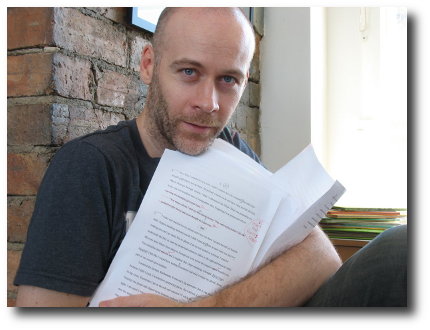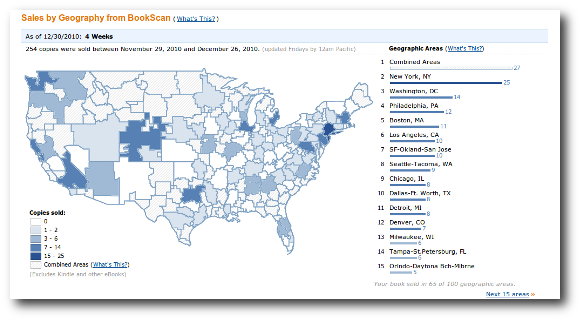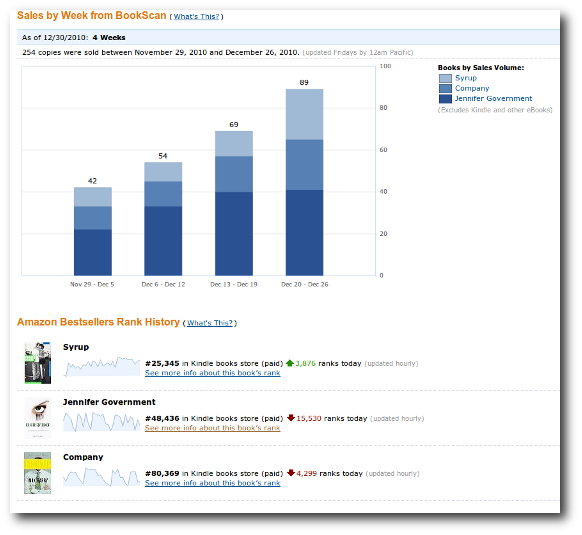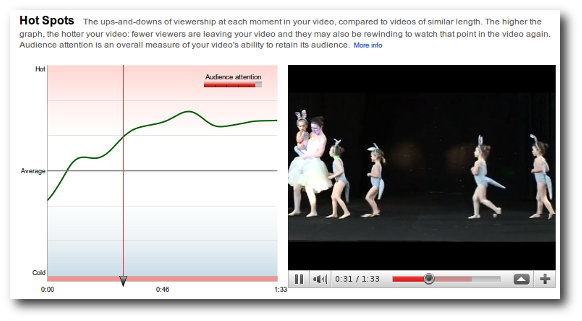 I'm telling my kid that the reason ladies on the radio sing "Turn me on" is they're pretending to be robots.
I'm telling my kid that the reason ladies on the radio sing "Turn me on" is they're pretending to be robots.
 I'm not getting old or anything, but does every song on the radio have to be about sex? My kid is in the car.
I'm not getting old or anything, but does every song on the radio have to be about sex? My kid is in the car.
 Pre-order "Machine Man" novel for under $10?! That is a pretty sweet deal. http://amzn.to/h0sldo
Pre-order "Machine Man" novel for under $10?! That is a pretty sweet deal. http://amzn.to/h0sldo
 Someone please track down these people who are for cutting government spending but against cutting services, and shake them.
Someone please track down these people who are for cutting government spending but against cutting services, and shake them.
Why I fled the office cubicle
![]() There are two types of employee: people and human resources. It’s easy to tell which one you are. If your boss says, “Todd, please have your team reach a final decision,” you’re a person. If she says, “Todd, please organize a team meeting, and because it’s lunch-time remember you should supply food, and please cut the breads or sandwiches into either halves or quarters, to discourage over-eating, and remember that crumbs and spills attract uninvited guests,” you’re a human resource. And you work for the New York City Department of Health.
There are two types of employee: people and human resources. It’s easy to tell which one you are. If your boss says, “Todd, please have your team reach a final decision,” you’re a person. If she says, “Todd, please organize a team meeting, and because it’s lunch-time remember you should supply food, and please cut the breads or sandwiches into either halves or quarters, to discourage over-eating, and remember that crumbs and spills attract uninvited guests,” you’re a human resource. And you work for the New York City Department of Health.
The difference between people and human resources is that people have brains. People don’t need a company policy on how to ascend stairs (stay left, hold the handrail at all times, look straight ahead: GE). People can figure that out for themselves. Human resources, on the other hand, are dumb as a box of hammers. They need everything spelled out. Human resources are basically office equipment with legs. They’re talking furniture. In fact, they’re worse than furniture, because at least furniture stays where you put it. It doesn’t have body odor, or forward chain e-mails, or stop by to tell you about their sick cat.
The Department of Health has taken a lot of heat over the last ten days for its “Life in the Cubicle Village” memo, a set of excruciatingly detailed guidelines for employees moving into its new offices in Long Island City this month. Some found it insulting to receive instructions on how to, for example, tell a co-worker they’re busy (“I’m in the middle of something. May I drop by or call you later [give a specific time]?”). Or to be told to avoid eavesdropping on cubicle neighbors (“If that fails, at least resist the urge to add your comments.”). Some thought the specifications on acceptable light snacks during meetings (“drinks cannot contain more than 25 calories per 8 ounces”) to be a little heavy on the micromanagement.
But these rules are totally necessary. Have you ever worked in an office? Then you know what I’m talking about. Some of these human resources are animals. If there weren’t company guidelines on how to navigate the revolving front door (wait for people inside to fully exit before stepping in: ExxonMobil), they’d never get past the lobby. They don’t actually follow the guidelines, of course. There are emails about the guidelines, they’re mentioned in the all-staff meetings, they’re on the cork board beside the coffee machine, but somehow still these people remain oblivious. Some do it on purpose. They deliberately flout the guidelines. You know that guy? Yeah. That guy. When he leaves half an inch of gritty black goo in the bottom of the percolator, he knows what he’s doing. He knows you’re going to stop by with exactly ninety seconds before being locked in a two-hour meeting on synergizing coalistics and all you want in the world is a quick caffeine hit. He enjoys your frustration. It’s what he lives for. It’s why he comes in every day. It sure isn’t to do any work. The man is useless. You will never understand why management can’t see that.
But I digress. The point is: human resources need rules. You don’t. You’re a person. To you, such minutia is not merely unnecessary, and not only an insult: it’s a challenge. Someone says you must cut bagels into halves or quarters, you know what you’re going to do? Frickin’ thirds. That’s right. Enjoy your bagel thirds, people. Because oppression foments rebellion. That’s what King George III didn’t realize. You can’t treat people like idiots. Not people people.
You’ll notice that managers are people. This is why the guidelines never apply to top brass. Sure, they’ll pretend to abide by them, to set a good example. But that’s for show. You don’t pay a CEO five million bucks a year to follow a set of instructions that could be performed by a well-trained monkey. CEOs should be using their initiative. Getting creative. Shedding outdated thinking. Pioneering new markets. You can’t do that by following the book.
But for the rest of us: guidelines. It’s because we’re living on top of each other. In the old days, when men were men and men had offices, it didn’t matter whether someone wore strong cologne. It would bother you for about eight seconds, as they passed by. With offices, loud personal conversations happened behind closed doors. We didn’t need guidelines on what constituted an acceptable ring-tone. Well. There were no ring-tones, obviously. But if there had been, it wouldn’t have mattered. Because of offices. Offices with doors.
Now it’s all open plan. It’s rolling cubicle farms. You know what we’re becoming? Singapore. It’s illegal to chew bubble gum in Singapore because everybody lives within earshot of five million other people. You can’t have that kind of population density without totalitarian social rules. That’s what these workplace guidelines are: blueprints for a new, cramped society.
I got out. I couldn’t take it any more. Now I work from home. My smells are my business. No-one leaves the coffee pot technically-not-empty but me. It’s not all upside. I miss the steady paycheck. I miss being able to go to the bathroom and think, ‘I’m getting paid for this.’ But I don’t miss the guidelines. I do like being a person.
 With the news of Trump polling well for the Presidency, I'm starting to suspect the US is not a real place but in fact a clever TV show.
With the news of Trump polling well for the Presidency, I'm starting to suspect the US is not a real place but in fact a clever TV show.
 Sometimes when my baby cries in the night, it takes me a few seconds to remember which year it is, and which daughter.
Sometimes when my baby cries in the night, it takes me a few seconds to remember which year it is, and which daughter.
 Daughter had her first playdate! Two minutes after being left in her room with him, she was buck naked. "I wanted to be silly," she says.
Daughter had her first playdate! Two minutes after being left in her room with him, she was buck naked. "I wanted to be silly," she says.
Tomato parable
![]() I wrote some code to embed my tweets on my website.
There’s a statement that would have made no sense in 1990.
Actually, it barely makes sense now. But I did it. I’m proud
of my site. I built it myself. Occasionally
I get an email saying, “What software do you
use to run your site and how do I get it?” I think the answer is:
receive a Commodore 64 for your tenth birthday and no good
games.
I wrote some code to embed my tweets on my website.
There’s a statement that would have made no sense in 1990.
Actually, it barely makes sense now. But I did it. I’m proud
of my site. I built it myself. Occasionally
I get an email saying, “What software do you
use to run your site and how do I get it?” I think the answer is:
receive a Commodore 64 for your tenth birthday and no good
games.
But that’s not why I’m writing. I’m writing because I decided to grow my own vegetables. A few people I knew were growing their own vegetables, and they kept yakking about how wonderful it was, not depending on manufactured supermarket vegetables, which are evil for some reason, so I thought what the hell.
For a while I was intimidated by the idea of growing vegetables. When I reach for a vegetable, I usually just want to eat it. I don’t want to be intimately involved with its creation. I worried I would end up spending more time tending to the health of fragile, overly complicated peas than eating them.
Then I saw an ad for genetically modified seeds. These promised to take the hassle out of growing vegetables, which seemed pretty intriguing. The tomatoes would be big and red and I wouldn’t have to do anything. So I got those.
This upset my hippy friends. Especially when I started having problems. My frankenfruit was supposed to be simple but after a few weeks the whole garden stopped growing. My cabbages were flaccid. My carrots were anemic. My spinach wouldn’t self-seed. It wasn’t supposed to self-seed. The genetics company had engineered it not to, so I’d have to buy new seeds each season. But I thought there should be a way around that.
I asked my hippy friends for help. Well! You’d think I asked for a kidney. They kept bringing up the fact that I was using GM seeds. Eventually they all got together and said, “Max… we can’t help you any more. We want to. But you brought these problems on yourself. And the thing is, when you ask for help, you’re actually asking us to use our skills and knowledge to prop up a corporatized product that’s not just practically inferior to the free alternative you ignored, but actually bad for the world. We just can’t do that.”
And that was how I taught them to stop asking me for help with Windows.
 My website traffic is up with people trying to figure out wtf Darren Aronofsky is doing. http://bit.ly/h4cjBk
My website traffic is up with people trying to figure out wtf Darren Aronofsky is doing. http://bit.ly/h4cjBk
 Library of Congress catalog data for Machine Man: "1. Mechanical Engineers—Fiction. 2. Artificial limbs—Fiction."
Library of Congress catalog data for Machine Man: "1. Mechanical Engineers—Fiction. 2. Artificial limbs—Fiction."
 Off to tell the publishing industry they're doing it all wrong. http://bit.ly/ehzC90
Off to tell the publishing industry they're doing it all wrong. http://bit.ly/ehzC90
Metrics
![]() I can’t believe people keep getting surprised by Facebook. They use your personal information to make money. They have no financial interest in your privacy but a huge one in eroding it. It’s been like that since forever.
I saw a guy post that he was “continuously shocked” by Facebook’s privacy invasions. How can you be continuously shocked? At some point, don’t you realize this is simply the way it is?
I can’t believe people keep getting surprised by Facebook. They use your personal information to make money. They have no financial interest in your privacy but a huge one in eroding it. It’s been like that since forever.
I saw a guy post that he was “continuously shocked” by Facebook’s privacy invasions. How can you be continuously shocked? At some point, don’t you realize this is simply the way it is?
Anyway. I didn’t mean to write about Facebook. I meant to write about technology. I’m allowed to do more geeky blogs this year, because I have a book coming out about cyborgs. So check this out. This is Amazon’s AuthorCentral Metrics. It shows how many of my books are being sold and where:
This is a free service to authors. There’s also a history:
Last time I had a book published, I had to wait ten months for a royalty statement to find out whether anyone bought it. Machine Man I’ll be able to follow in almost-real-time. I’m not sure whether that’s useful for anything, other than satisfying impatience. But still.
Here’s what I really want. The screenshot below is from YouTube. A while back I uploaded a video of my daughter being incredibly cute. YouTube tracks whether people watch all the way to the end, and, if not, where they give up, to create a graph of “attention.”
I want this for books. I would kill for it. I want to know at which point people are putting my books down, or giving up on them, so I can write better ones next time. I want to know which parts they re-read. It’s got to be possible now, with e-readers. Get on that, Amazon.
 Post office just asked for what they described as a "terrorism surcharge" when mailing a package to the US. Not kidding. $9.
Post office just asked for what they described as a "terrorism surcharge" when mailing a package to the US. Not kidding. $9.
Copyedits
![]()
 Look
at me! I’m clinging to life here. I’ve been so sick I couldn’t even reach the razor. That was for the first few days. Then I started to like it. I have about twelve hours of this Man Grizzly look left before Jen realizes it’s voluntary.
Look
at me! I’m clinging to life here. I’ve been so sick I couldn’t even reach the razor. That was for the first few days. Then I started to like it. I have about twelve hours of this Man Grizzly look left before Jen realizes it’s voluntary.
Copyedits off to Vintage today. I pity the fool who has to typeset this mess. I went nuts. And I don’t even know what most copyediting symbols mean. I had to guess.
It’s 2011 and publishers still print out manuscripts, manually scribble on them, and type the whole thing in again.
 For our 18th wedding anniversary today, I gave my wife the gift of caring for me while I complained about how sick I am.
For our 18th wedding anniversary today, I gave my wife the gift of caring for me while I complained about how sick I am.
 Lost 2.5kg (5.5lb) in five days from crazy flu. Want to know what 2.5kg of sweat looks like? I can tell you.
Lost 2.5kg (5.5lb) in five days from crazy flu. Want to know what 2.5kg of sweat looks like? I can tell you.
 Trying to decide whether I want to be woken in night by oversensitive smoke alarm or die in house fire.
Trying to decide whether I want to be woken in night by oversensitive smoke alarm or die in house fire.
 "The most powerful economic force on Earth is a mother's desire for her child to have a better chance in life than she had." Michael Pascoe
"The most powerful economic force on Earth is a mother's desire for her child to have a better chance in life than she had." Michael Pascoe
 The sweetest part of my day is sharing a bath with my baby daughter, before she fills the tub with excrement.
The sweetest part of my day is sharing a bath with my baby daughter, before she fills the tub with excrement.
 When I packed away my 56kbps modem card in 2003, I didn't think it was for my daughter's WALL-E costume.
When I packed away my 56kbps modem card in 2003, I didn't think it was for my daughter's WALL-E costume.
 It's good to know that if I ever need more bitterness and disappointment in my life, I can always follow soccer.
It's good to know that if I ever need more bitterness and disappointment in my life, I can always follow soccer.
 It has been brought to my attention that I look like Matt Hasselbeck. http://bit.ly/fMfxiE
It has been brought to my attention that I look like Matt Hasselbeck. http://bit.ly/fMfxiE
Fifteen Ways to Write a Novel
![]() Every year I get asked what I think about
NaNoWriMo, and I don’t
know how to answer, because I don’t want to say, “I think it makes
you write a bad novel.”
Every year I get asked what I think about
NaNoWriMo, and I don’t
know how to answer, because I don’t want to say, “I think it makes
you write a bad novel.”
This is kind of the point. You’re supposed to churn out 50,000 words in one month, and by the end you have a goddamn novel, one you wouldn’t have otherwise. If it’s not Shakespeare, it’s still a goddamn novel. The NaNoWriMo FAQ says: “Aiming low is the best way to succeed,” where “succeed” means “write a goddamn novel.”
I find it hard to write a goddamn novel. I can do it, but it’s not very fun. The end product is not much fun to read, either. I have different techniques. I thought I should wait until the end of November, when a few alternatives might be of interest to those people who, like me, found it really hard to write a goddamn novel, and those people who found it worked for them could happily ignore me.
Some of these methods I use a lot, some only when I’m stuck. Some I never use, but maybe they’ll work for you. If there were a single method of writing great books, we’d all be doing it.
The Word Target
What: You don’t let yourself leave the keyboard each day until you’ve hit 2,000 words.
Why: It gets you started. You stop fretting over whether your words are perfect, which you shouldn’t be doing in a first draft. It captures your initial burst of creative energy. It gets you to the end of a first draft in only two or three months. If you can consistently hit your daily target, you feel awesome and motivated.
Why Not: It can leave you too exhausted to spend any non-writing time thinking about your story. It encourages you to pounce on adequate ideas rather than give them time to turn into great ones. It encourages you to use many words instead of few. If you take a wrong turn, you can go a long way before you realize it. It can make you feel like a failure as a writer when the problem is that you’re trying to animate a corpse. It can make you dread writing.
The Word Ceiling
What: You write no more than 500 words per day.
Why: You force yourself to finish before you really want to, which makes you spend the rest of the day thinking about getting back to the story, which often produces good new ideas. You feel good about yourself even if you only produced a few hundred words that day. You don’t beat yourself up about one or two bad writing days. You give yourself time to turn good ideas into great ones. Writing feels less like hard work. (More on this.)
Why Not: It takes longer (six months or more). It can be difficult to work on the same idea for a very long time. It may take so long that you give up.
The Coffee Shop
What: You take your laptop, order a coffee, and compose your masterpiece in public.
Why: It gets you out of the house, which may help to break a funk. You’re less likely to goof off if people are watching. It feels kind of cool.
Why Not: It’s extremely distracting. You look like a dick. You lose a deceptively large amount of time to non-writing activities (getting there, setting up, ordering coffees, considering bagels…).
The Quiet Place
What: You go to your own particular writing place and close the door on the world.
Why: It removes distractions. It can feel like a special, magical retreat, where you compose great fictions (particularly if it’s somewhere you only use for writing, not checking email, doing your taxes, and leveling your Warlock).
Why Not: You may not have one. You may find it depressing if you’ve had a tough time writing lately. You can end up fussing over making your Writing Place perfect instead of writing.
The Burst
What: You write in patches of 30-60 minutes. When you feel your concentration flag, you go do something else for 30 minutes, then return.
Why: It freshens you up. You find solutions to difficult story problems pop into your head after a breather. You can find time to write more easily, knowing you’re only sitting down for a short while. When you’re “running out of time,” you can feel energized and write very quickly.
Why Not: It’s more difficult to sink into the zone if you know another activity is just around the corner. It can encourage you to look for excuses to stop writing. It discourages more thoughtful writing.
The Immersion
What: You pull out the network cord, turn off the phone, and write in blocks of four hours.
Why: It eliminates distractions. You can relax knowing that you have plenty of time to write. It encourages thoughtful writing.
Why Not: You can wind up grinding. You can feel reluctant to start writing, knowing that such a huge block of time awaits.
The Intoxicant
What: You consume alcohol, narcotic, or caffeine before writing.
Why: Dude, those words just gush.
Why Not: You may be part of the 99.9% of the population that writes self-indulgent gibberish.
Sidenote: There is no case of writer’s block that can’t be cured with enough caffeine.
The Headphones
What: You strap on headphones and crank up the volume.
Why: It’s inspiring. It can quickly put you in the right frame of mind for a scene. It can block out other noise that would otherwise be distracting.
Why Not: You can’t think as clearly. You can be misled into thinking you’re writing a powerful/exciting/tragic scene when in fact it’s just the music.
The Break of Dawn
What: You wake, walk directly to your computer, and write.
Why: Your mind is at its clearest and most creative. You haven’t started thinking about the real world yet. Your body is not fuzzing your mind with digestion. If you write for a while, you develop a hunger dizziness that’s mildly stimulating. (This can be combined with coffee.)
Why Not: You may not be a morning person. You may only be able to write for a short while before becoming too hungry to continue. Your lifestyle may not permit it.
The Dead of Night
What: You write at night, after everyone’s gone to sleep.
Why: It feels kind of cool. It’s often a reliable distraction-free time. You can often be in a fairly clear, creative frame of mind.
Why Not: You may only be able to write for a short while before becoming too tired to write coherently. You may be too tired to repeat the process regularly. You may not be a night person.
The Jigsaw
What: You start writing the scenes (or pieces of scenes) that interest you the most, and don’t worry about connecting them until later.
Why: You capture the initial energy of ideas. You can avoid becoming derailed by detail. You make sure your novel revolves around your big ideas.
Why Not: It can be difficult to figure out how to connect the scenes after the fact. You need to rewrite heavily in order to incorporate ideas you had later for earlier sections. Your characters can be shakier because you wrote scenes for them before you knew the journey they’d make to get there.
The End-to-End
What: You start at the beginning and write the entire thing in sequence.
Why: You see the story as a reader will. You feel more confident about your characterizations, pacing, and logical progression of plot. It’s simpler.
Why Not: You can become bogged down in boring sections you think are necessary to set-up good stuff (not realizing yet that you don’t need those boring sections, or that they can be far shorter than you think). You can wind up far from where you intended to go, never finding a place for those initial ideas. (This may not be a bad thing.)
The Outline
What: You sketch out plot, characters, and turning points before you start writing.
Why: You feel like you know what you’re doing. You can feel excited because you know big stuff is coming. You tend to produce a better structure, with larger character arcs and clearer plot twists.
Why Not: What seems like a brilliant idea for an ending on day 1 can seem trite on day 150, when you understand the characters and story better. You feel pressure to make your characters do implausible things in order to fit your outline. You can close yourself off to better ideas. You can become bored because you already know what’s going to happen.
The Journey
What: You start writing with no real idea of where you’ll wind up.
Why: It’s exciting. Discovering a story as you write it is one of life’s great joys. Your characters have freedom to act more naturally and drive the story, rather than be bumped around by plot.
Why Not: You can end up nowhere very interesting. You tend to write smaller, more realistic stories, which may not be what you want.
The Restart
What: You abandon the story you’re working on, even though you know it’s brilliant and the idea is perfect but GODDAMN it is driving you insane for some reason
Why: It’s a bad idea. There might be a good idea inside it somewhere, but you’ve surrounded it with bad characters or plot or setting or something and the only way to salvage it is to let all that other stuff go.
Why Not: While loss of motivation is always, always, always because the story isn’t good enough, and some part of you knows it, you rarely need to throw away the whole thing. Often deleting the last sentence, paragraph, or scene is enough to spark ideas about new directions. Sometimes you only need to give up a plan for the future. Changing your mind about where you’re going can allow you to write the story you really want. (More on this.)



















































 0 comments
0 comments


